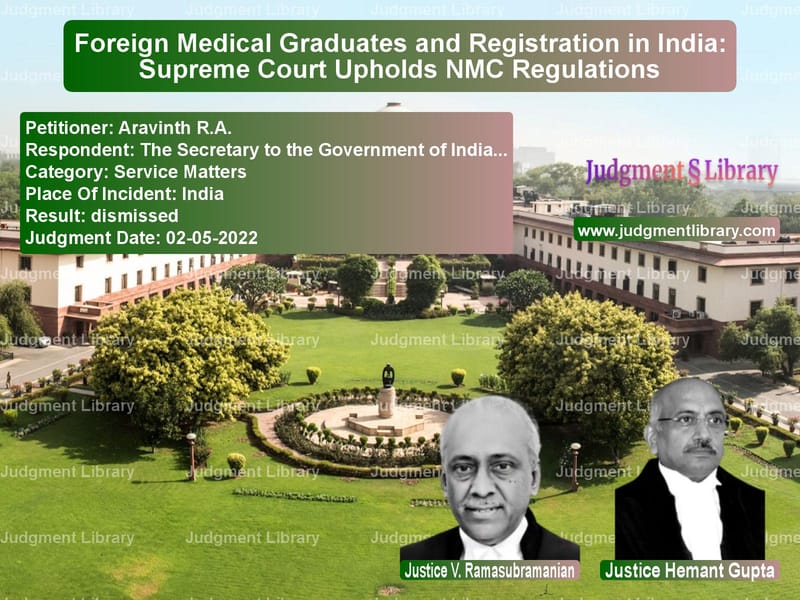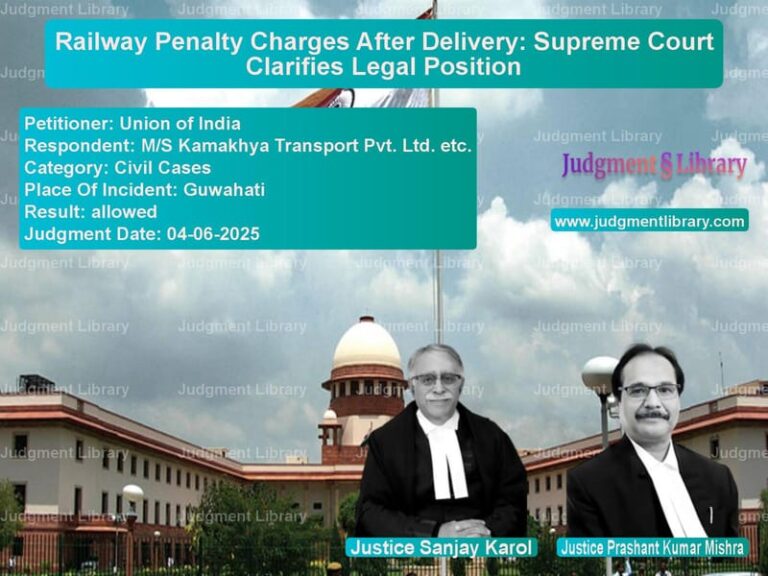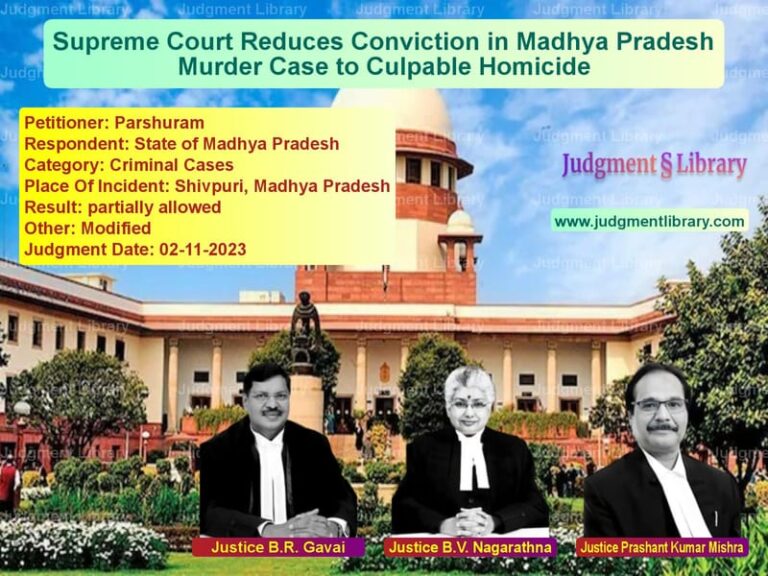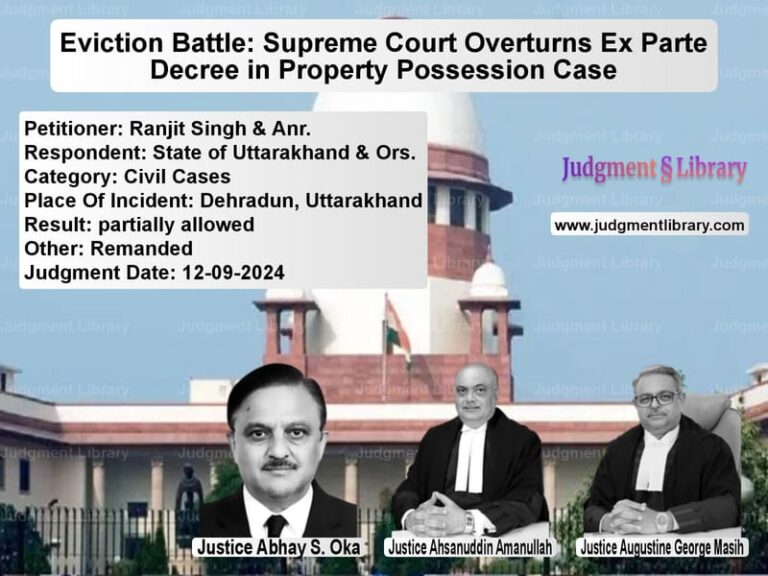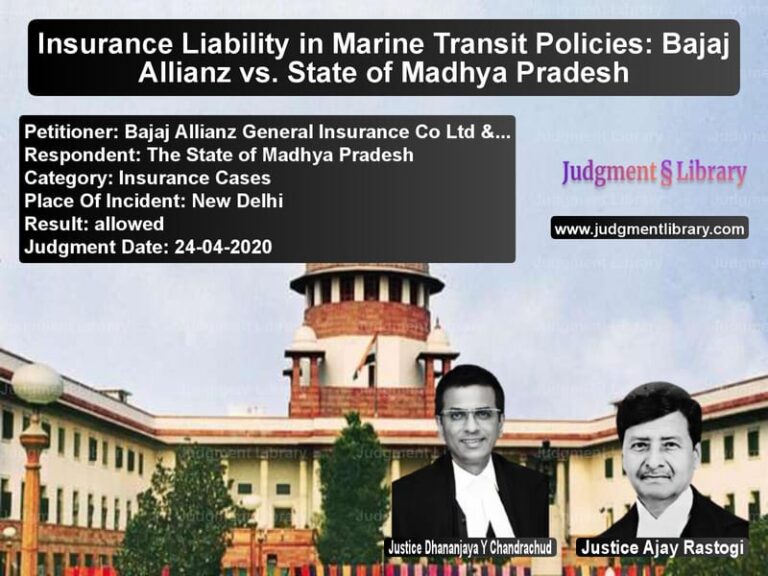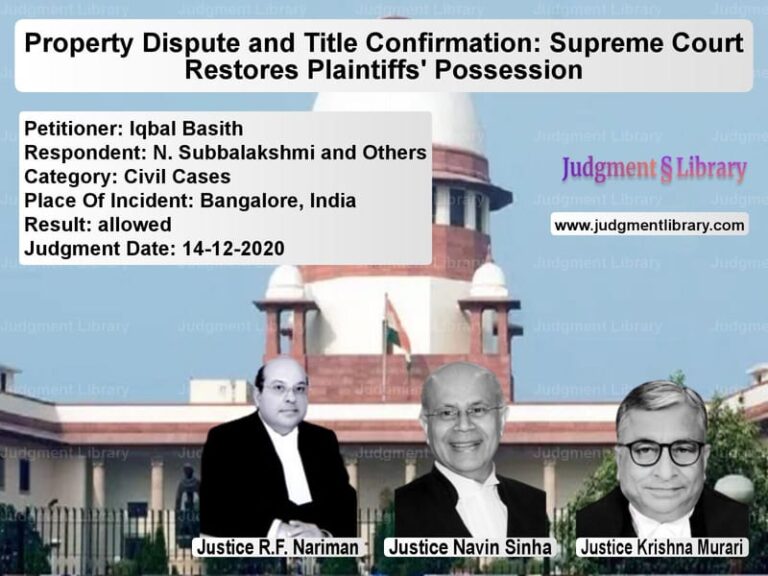Foreign Medical Graduates and Registration in India: Supreme Court Upholds NMC Regulations
The Supreme Court of India, in a recent judgment, upheld the regulations introduced by the National Medical Commission (NMC) concerning the registration of Foreign Medical Graduates (FMGs) in India. The case, Aravinth R.A. vs. The Secretary to the Government of India, Ministry of Health and Family Welfare & Others, revolved around the validity of the NMC (Foreign Medical Graduate Licentiate) Regulations, 2021, and the NMC (Compulsory Rotating Medical Internship) Regulations, 2021. The petitioner challenged these regulations as ultra vires, arguing that they imposed excessive and unreasonable restrictions on foreign medical graduates. However, the Supreme Court dismissed the appeal, emphasizing the necessity of maintaining high medical education standards in India.
Background of the Case
The appellant, Aravinth R.A., completed his higher secondary education under the CBSE scheme and appeared for the NEET exam in 2021. Due to his rank, he could not secure admission to a medical college of his choice in India and intended to pursue an undergraduate medical degree at Anna Medical College in Mauritius. However, the introduction of the Licentiate and CRMI regulations in November 2021 imposed new conditions on foreign medical graduates, which the appellant contended were arbitrary and unconstitutional.
The appellant filed two writ petitions before the Madras High Court, challenging certain provisions of the NMC regulations. The High Court dismissed the petitions, stating that the regulations were framed to ensure minimum standards of medical education and did not violate constitutional rights. The appellant then approached the Supreme Court.
Key Provisions Challenged
The appellant challenged specific clauses of the NMC (Foreign Medical Graduate Licentiate) Regulations, 2021, and the NMC (Compulsory Rotating Medical Internship) Regulations, 2021. The provisions in question were:
- Licentiate Regulations, 2021:
- Foreign medical graduates must complete a minimum 54-month course duration.
- Internship for a minimum of 12 months must be completed at the same foreign institution.
- The FMG must register with the professional regulatory body in the foreign country.
- FMGs must complete an additional 12-month supervised internship in India.
- CRMI Regulations, 2021:
- Foreign medical graduates must undergo internship equivalent to Indian medical graduates.
- FMGs must complete the National Exit Test (NExT) before obtaining permanent registration.
- Internship slots for FMGs should be in newly established medical colleges.
Arguments Presented by the Petitioner
The appellant’s primary arguments before the Supreme Court were:
- The regulations imposed an unreasonable burden on FMGs, making it harder for them to return and practice in India.
- Regulation 4(a)(i) limiting the course duration to 54 months restricted students’ choices.
- Requiring an internship at the same foreign institution and registration with the respective country’s regulatory body amounted to extra-territorial legislation.
- The regulations caused undue hardship by mandating dual internships—one abroad and another in India.
- The disparity in course duration and requirements for FMGs and Indian medical graduates violated Article 14 (Right to Equality).
- The new requirements discouraged students from pursuing medical education abroad and contributed to brain drain.
Arguments Presented by the Respondents
The Union of India and the National Medical Commission defended the regulations, arguing that:
- The regulations aimed to maintain the quality of medical education and prevent substandard foreign graduates from practicing in India.
- Prescribing a 54-month course duration was necessary to ensure uniformity with Indian medical programs.
- Requiring an internship at the same foreign institution prevented graduates from skipping practical training.
- Registration with the foreign medical authority ensured that the FMG’s qualification was valid in their country of study.
- The additional 12-month internship in India was essential to familiarize FMGs with local healthcare conditions.
- Providing internship opportunities in new medical colleges helped in the expansion of medical education infrastructure.
Supreme Court’s Judgment
The Supreme Court, while dismissing the appeal, upheld the regulations, observing:
“The prescription of an internship for a minimum duration of 12 months in the same foreign medical institution cannot also be said to be a duplication of internships. The purpose of an internship is to test the ability of the students to apply their academic knowledge to practical subjects, namely, the patients.”
The Court further emphasized the importance of maintaining high standards in medical education and rejected the claim that these regulations violated the right to practice under Article 19(1)(g). It held:
“It is true that the country needs more doctors, but it needs really qualified doctors and not persons trained by institutions abroad, to test their skills only in their motherland.”
The Court also dismissed the appellant’s contention that the regulations amounted to extra-territorial legislation, stating that they merely prescribed standards for those intending to practice medicine in India.
Implications of the Judgment
The Supreme Court’s ruling reaffirms the importance of stringent medical regulations to uphold healthcare standards. The key implications include:
- FMGs must comply with the new eligibility criteria to secure registration in India.
- The ruling reinforces the role of the National Exit Test (NExT) as a uniform licensure examination.
- The judgment supports the government’s broader objective of curbing substandard medical education institutions abroad.
- It sets a precedent for maintaining rigorous standards for foreign medical graduates.
Conclusion
The Supreme Court’s decision underscores the necessity of maintaining high educational and professional standards in the medical field. By upholding the NMC regulations, the Court has reinforced the importance of rigorous training for FMGs to ensure that only competent professionals enter the Indian healthcare system. While the ruling may make it more challenging for foreign medical graduates to practice in India, it ultimately serves the larger interest of ensuring quality healthcare for Indian citizens.
Petitioner Name: Aravinth R.A..Respondent Name: The Secretary to the Government of India, Ministry of Health and Family Welfare & Others.Judgment By: Justice V. Ramasubramanian, Justice Hemant Gupta.Place Of Incident: India.Judgment Date: 02-05-2022.
Don’t miss out on the full details! Download the complete judgment in PDF format below and gain valuable insights instantly!
Download Judgment: aravinth-r.a.-vs-the-secretary-to-the-supreme-court-of-india-judgment-dated-02-05-2022.pdf
Directly Download Judgment: Directly download this Judgment
See all petitions in Employment Disputes
See all petitions in Recruitment Policies
See all petitions in Public Sector Employees
See all petitions in Education Related Cases
See all petitions in Judgment by V. Ramasubramanian
See all petitions in Judgment by Hemant Gupta
See all petitions in dismissed
See all petitions in supreme court of India judgments May 2022
See all petitions in 2022 judgments
See all posts in Service Matters Category
See all allowed petitions in Service Matters Category
See all Dismissed petitions in Service Matters Category
See all partially allowed petitions in Service Matters Category

